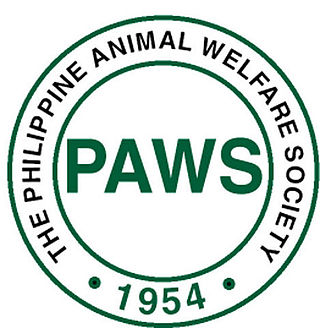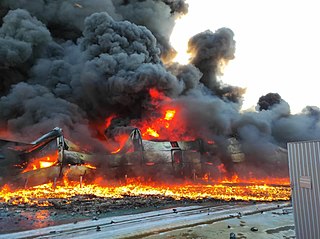Related Research Articles

Animal welfare is the well-being of non-human animals. Formal standards of animal welfare vary between contexts, but are debated mostly by animal welfare groups, legislators, and academics. Animal welfare science uses measures such as longevity, disease, immunosuppression, behavior, physiology, and reproduction, although there is debate about which of these best indicate animal welfare.
The American Society for the Prevention of Cruelty to Animals (ASPCA) is a non-profit organization dedicated to preventing animal cruelty. Based in New York City since its inception in 1866, the organization's mission is "to provide effective means for the prevention of cruelty to animals throughout the United States."
An animal rescue group or animal rescue organization is a group dedicated to pet adoption. These groups take abandoned, abused, or stray pets and attempt to find suitable homes for them. Many rescue groups are created by and run by volunteers, who take animals into their homes and care for them—including training, playing, handling medical issues, and solving behavior problems—until a suitable permanent home can be found.
The Born Free Foundation is an international wildlife charity that campaigns to "Keep Wildlife in the Wild". It protects wild animals in their natural habitat, campaigns against the keeping of wild animals in captivity and rescues wild animals in need. It also promotes compassionate conservation, which takes into account the welfare of individual animals in conservation initiatives. Born Free also creates and provides educational materials and activities that reflect the charity's values.

The Animal Protection and Rescue League (APRL) is an American grassroots animal rights organization, founded in 2003, based in California's San Diego and Orange Counties.

An animal sanctuary is a facility where animals are brought to live and to be protected for the rest of their lives. Pattrice Jones, co-founder of VINE Sanctuary defines an animal sanctuary as "a safe-enough place or relationship within the continuing hazards that menace everybody". In addition, sanctuaries are an experimental staging ground for transformative human–animal relations. There are five types of animal sanctuaries reflective of the species-belonging of the residents: 1) companion animal sanctuaries; 2) wildlife sanctuaries; 3) exotic animal sanctuaries; 4) farmed animal sanctuaries; and 5) cetacean sanctuaries.
Animal welfare and rights in Israel is about the treatment of and laws concerning nonhuman animals in Israel. Israel's major animal welfare law is the Animal Protection Law, passed in 1994, which has been amended several times since. Several other laws also related to the treatment of animals: Rabies Ordinance, 1934; Fishing Ordinance, 1937; Public Health Ordinance, 1940; Wildlife Protection Law, 1955; Plants Protection Law, 1956; Criminal Procedure Law, 1982; Animal Disease Ordinance, 1985; National Parks, Nature Reserves, National Sites and Memorial Sites Law, 1991; the Law of Veterinarians, 1991; Dog Regulation Law, 2002; Rabies Regulations (Vaccinations), 2005; and Prohibition on declawing cats unless for reasons vital to the cat's health or owner's health, 2011.
The Humane Society of the United States (HSUS) is an American nonprofit organization that focuses on animal welfare and opposes animal-related cruelties of national scope. It uses strategies that are beyond the abilities of local organizations. It works on issues including pets, wildlife, farm animals, horses and other equines, and animals used in research, testing and education. As of 2001, the group's major campaigns targeted factory farming, hunting, the fur trade, puppy mills, and wildlife abuse.

Farm Sanctuary is an American animal protection organization, founded in 1986 as an advocate for farmed animals. It was America's first shelter for farmed animals. It promotes laws and policies that support animal welfare, animal protection, and veganism through rescue, education, and advocacy. Farm Sanctuary houses over 800 cows, chickens, ducks, geese, turkeys, pigs, sheep, and goats at a 300+ acre animal sanctuary in Watkins Glen, New York, and more than 100 animals at its location in Acton, California, near Los Angeles.

The Philippine Animal Welfare Society (PAWS) is a volunteer-based, non-government organization whose goal is to prevent animal cruelty through education, animal sheltering and advocacy, based in Quezon City, Philippines. It was founded in 1954 by Muriel Jay. PAWS believes that the creation of a more peaceful society starts with the widening of mankind's circle of compassion which includes animals, thereby envisions a nation that respects animals, practices responsible pet ownership and protects wildlife. The volunteer-based organization rehabilitates these animals in the hope of finding them new homes and a second chance at a good life. PAWS does not take in pets of other people, but only victims of cruelty or neglect where the animal offenders are charged with violation of the Animal Welfare Act in court.
The Humane League (THL) is an international nonprofit organization that works to end the abuse of animals raised for food through corporate, media and community outreach. It operates in the United States, Mexico, the UK and Japan. THL promotes plant-based diets, conducts research on the effectiveness of different interventions, and works to obtain animal welfare commitments from companies. It was founded in 2005 in Philadelphia by Nick Cooney.

People For Animals is one of India's largest animal welfare organisations, originally founded by Maneka Gandhi in 1992. Currently, the headquarters of this organisation is located in New Delhi, with over 100 regional units located around India.

Four Paws is a global animal welfare organisation based in Vienna, Austria. It focuses on improving the living conditions of animals under direct human influence, by revealing suffering, rescuing animals in need, and protecting them.

On 24 February 2022, the Russian army attempted to capture Sumy, located near the Russia–Ukraine border. Ukrainian paratroopers and territorial defense forces began engaging Russian forces within the city, resulting in heavy urban fighting and the destruction of a Russian tank column. That evening, Ukraine's paratroopers were ordered to withdraw from the city, leaving the city's defense to a few thousand local volunteers armed with rifles, limited anti-tank weapons and no armed vehicles or heavy weaponry. After three to four days of failing to enter the city, the Russian military shifted to encircle and bypass the city, and were then subject to guerrilla ambushes.

Oleksandr Mykolaiovych Kamyshin is a Ukrainian politician who has been the Minister of Strategic Industries since 21 March 2023. He was the CEO of state-owned Ukrainian Railways from August 2021 to late February 2023.
Every Animal is a vegan animal rights organization in Ukraine.

Oleksandr Valeriyovyvch Marikovskyi is a Ukrainian economist and politician, who is currently a member of the Member of the Verkhovna Rada of the 9th convocation. He is the Deputy Chairman of the Committee on Environmental Policy in the Verkhovna Rada of Ukraine of the 9th convocation 29 August 2019.
Future for Ukraine Charity Foundation is a charity established in the early spring 2022 in Warsaw, with offices in Kyiv and Washington.The FFU Foundation has received the official status of a 501c3 organization and an EIN in the state of Maryland, USA. The funds work on the principle of crowdfunding and raise funds for charitable assistance in four areas: medicine, psychological help for women, assistance to children, and humanitarian aid.
Kherson is the name given to one of two raccoons stolen from Kherson by Russian zookeeper Oleg Zubkov during the Russian retreat from the city during the Russian invasion of Ukraine. The animal became a subject of memes following the theft, referred to as the raccoon of Kherson. A pro-Russian Telegram channel is dedicated to the animal.
References
- ↑ Istomina, Toma. "Oleksandr Todorchuk: Vegetarian activist launches initiative to promote better treatment of animals". Kyiv Post. Retrieved 17 May 2022.
- ↑ "У центрі Києва протестують проти використання тварин в цирках". Україна молода (in Ukrainian). Retrieved 17 May 2022.
- ↑ "The Nonhuman Victims of Putin's War". Project Syndicate. Retrieved 17 May 2022.
- 1 2 "Одразу сім українських модних брендів відмовилися від хутра". 24 канал (in Ukrainian). Retrieved 17 May 2022.
- ↑ "UAnimals in Fur Free Alliance". furfreealliance.com. Retrieved 17 May 2022.
- ↑ "UAnimals in International Anti-Fur Coalition". antifurcoalition.org. Retrieved 17 May 2022.
- ↑ "ФОТО: До маршу за права тварин у Києві долучилися чотирилапі". 5 канал (in Ukrainian). Retrieved 17 May 2022.
- ↑ Horton, Ben Anthony. "'Hundreds died, suffering': Cats and dogs left without food and water in Ukraine, says charity". Euronews.green. Retrieved 17 May 2022.
- ↑ Fergo, Javier. "The volunteers saving animals in Ukraine – photo essay". The Guardian. Retrieved 17 May 2022.
- ↑ "Animals and War. The Photostory". Ukraїner. Retrieved 17 May 2022.
- ↑ Torrelle, Kenny. "Animal welfare in wartime". VOX. Retrieved 17 May 2022.
- ↑ "Rescue of animals from Borodyanka shelter and Yasnogorodka farm". Ukraine Crisis Media Center. Retrieved 17 May 2022.
- ↑ Reeder, Jen. "How to help animals in Ukraine: 5 verified charities working on the ground". Today. Retrieved 17 May 2022.